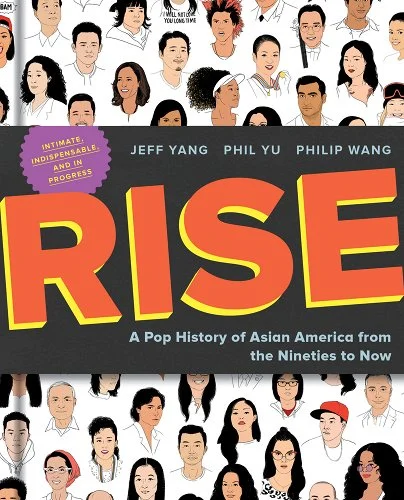 Rise: A Pop History of Asian America from the Nineties to Now is a monster of a book — both in that it is chock full of excellent content and that it literally weighs a ton (okay not a literal ton, but how is co-author Phil Yu holding it with just one hand). Written by an all-star team of journalist/critic Jeff Yang, Angry Asian Man Phil Yu and co-founder of Wong Fu Productions Philip Wang, Rise traverses decades of Asian American history, pop culture, books, movies, music, and more. Starting with BEFORE, Rise dedicates most of its pages to sections on the 1990s, 2000s, and 2010s, and then goes BEYOND.
Rise: A Pop History of Asian America from the Nineties to Now is a monster of a book — both in that it is chock full of excellent content and that it literally weighs a ton (okay not a literal ton, but how is co-author Phil Yu holding it with just one hand). Written by an all-star team of journalist/critic Jeff Yang, Angry Asian Man Phil Yu and co-founder of Wong Fu Productions Philip Wang, Rise traverses decades of Asian American history, pop culture, books, movies, music, and more. Starting with BEFORE, Rise dedicates most of its pages to sections on the 1990s, 2000s, and 2010s, and then goes BEYOND.
And despite its textbook-like weight, it reads as anything but. The tone is super conversational, friendly, and often hilarious even when tackling less than hilarious topics like yellowface across the decades. And it’s beautifully designed to boot, filled with brightly colored illustrations, lists, round table conversations, pull-out spreads, graphic novel storytelling and more that keep the 450+ pages entertaining and lively. Plus the authors invited scores of other folks to add their voices: “We don’t claim to be the only observers of this journey, the most objective, or the most diverse. We’re three guys of East Asian descent, and two of us are named Phil. So we’ve reached out to many people to help tell this story.” To name a few: a conversation between Rosalind Chao, Ming-Na Wen, Lauren Tom, and Tamlyn Tomita (if I need to tell you who they are, you definitely need this book); playlists for each decade from Richie “Traktivist” Menchavez, and “Postcards from Asian America.”
Some of what’s covered I knew, some of it I lived through (why yes, I did have an AOL screen name with AZN in it, and it’s surreal to see it reflected back as a larger phenomenon), but tons of it was new to me. Growing up in white suburbia in the 90s meant I had limited access to the wider world for many reasons, not least of which was that the only TV I could watch was PBS. So there’s lots I missed — like Asian Avenue, which I was too young to have experienced, or the whole Fast and the Furious thing and how many Asian Americans have won reality television contests, which I can only really blame on oblivion — and lots I’ve come away from Rise wanting to know more about. But even for the things I remember living through, the YouTubers I remember gaining fame, the groundbreaking politicians I remember getting elected, it’s great to see it all together, and to have so many voices and stories included. I can’t even begin to cover the half of what’s in here. But you really come away with a sense of steps forward and steps backward, and how Asian America has built itself up on the shoulders of those who came before.
I appreciate how BEFORE offers a concise but pretty thorough jaunt through Asian American history 101 and much of what set the stage for the larger part of the book — including immigration history, where the term Asian America came from anyways, Vincent Chin, and Miss Saigon. And then comes the bulk of the book on the 90s, 00s, and 2010s. The co-authors’ each introduce a decade, sharing their own experiences while linking it to the larger context of major shifts and events in Asian America (Jeff for 90s, Phil for 00s and Philip for 10s). Next are entries like Founding Fathers and Mothers, the Asian American Syllabus of “must-consume media,” Undercover Asians, and the Asian American Yearbook that are repeated each decade, as well as decade-specific pieces like Wen Ho Lee, FAQs about Apu, and a conversation on Black and Asian. I loved the pull-out spreads illustrating different spaces — the Home, Asian Grocery Stores, Boba Shops, to name a few. Asian Grocery Stores’ feature #8 is “Bags of dried stuff: You have no idea what it is, and it smells like a dusty sock, but Grandma swears it will heal whatever ails you.” I mean, can you say, nailed it.
Rise is an homage to Asian America, its successes and its shortcomings, its diversity and complexity, its encounters with racism, haters, xenophobia, etc. I promise you will learn something new. And in all likelihood, you, like me, will leave with a list of books you want to read, movies you want to watch, music to listen to, and a warm fuzzy feeling for all Asian America has been, is, and will continue to be.








